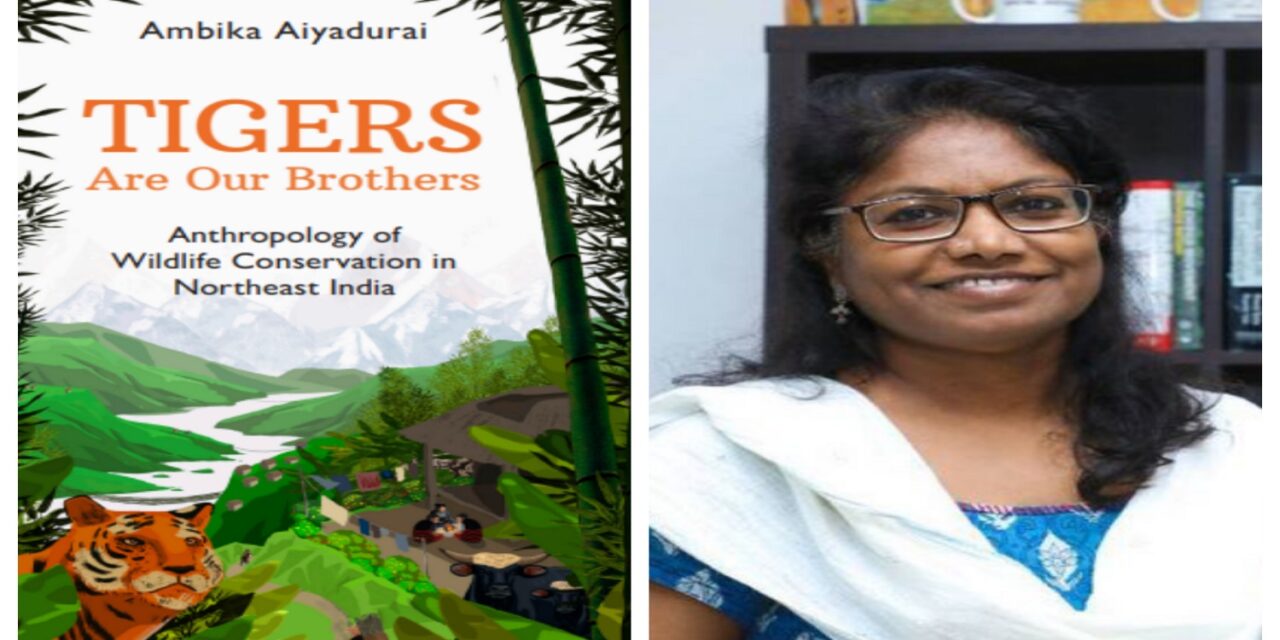STORY CREDITS
Writer/Editor: Shivangi Vasudev Bhatt
Photo: Media and Communication, IIT Gandhinagar
Ahead of the World Wildlife Conservation Day, IITGN hosted a discussion session on November 23, 2021, on ‘Tigers Are Our Brothers: Anthropology of Wildlife Conservation in Northeast India’, a book penned by Prof Ambika Aiyadurai, Assistant Professor, Humanities and Social Sciences, IITGN. Prof Sarit Kumar Chaudhuri, Professor of Anthropology, Rajiv Gandhi University, Itanagar, joined the event virtually as the discussant and Prof Alok Kumar Kanungo, Assistant Research Professor, IITGN, moderated the session.
The book, recently published by Oxford University Press, is based on Prof Ambika Aiyadurai’s long-term ethnographic fieldwork along the Sino-India borderlands of Arunachal Pradesh and critically engages in debates of wildlife conservation and its impact on the lives of Idu Mishmi, an indigenous community of Dibang Valley.
The author of the book Dr Aiyadurai highlighted the main contents of her book and discussed the conflict between natural science, social science and conservation. She underlined the importance of looking at the concept of conservation from the perspective of the indigenous communities. Stressing on the need for an inclusive, culturally informed, and people-centric approach to wildlife conservation, Dr Aiyadurai said, “Human-dimensions in wildlife conservation are largely invisible, especially narratives of ethnic communities, who live in and around conservation sites. This book provides crucial insights of the impact of wildlife research and conservation on the lives of local communities and provides multiple narratives and alternate approaches to wildlife conservation.”
The discussion, which was very lively, took the audience to Arunachal Pradesh’s Dibang Valley, which was her field site. Through the stories and everyday lives of the people in Dibang Valley she gave a fascinating account of looking at conservation and nature from the eyes of local communities people who consider nature as an extension of themselves. She also highlighted the importance of interdisciplinary understanding when dealing with nature and conservation.
While introducing the book, Prof Sarit Kumar Chaudhuri described it as one of the finest books written so far by an Indian anthropologist on wildlife conservation issues in the context of Northeast India. He complimented the book for its rich anthropological detail written in such a way that even a novice can understand and appreciate.
He situated the discussion in its field site and enlightened the audience on the unique demography of Arunachal Pradesh and Dibang Valley and the transformation it had gone through over the years. Highlighting the author’s training as a wildlife biologist and as an anthropologist that has added unique style and detail to the book, which necessitates an interdisciplinary approach to understand the different marginalised communities within Arunachal Pradesh, Prof Chaudhuri said, “This book will be a very useful text to students and scholars irrespective of their research areas or disciplinary boundaries. It is an example of what we call ‘interdisciplinary research’, without losing the focus on the core discipline of anthropology, to which she belongs. She has touched upon issues of identity, development, borderlands and science. Her long term ethnographic fieldwork provides us with new perspectives and a new understanding of India’s Northeast region.”
He also appreciated researcher’s involvement with different sections of the community to understand what conservation and nature means to them in their everyday lives. The discussant also raised important questions on gender and other aspects of the book that emerge from the account for future work.
The credit for the title of the book ‘Tigers are our brothers’ must be given to the Idu Mishmi of Arunachal Pradesh. The Idu Mishmi people of Dibang Valley believe that tigers are their elder brothers. Killing tigers is, for the Idu Mishmi, a taboo. While their beliefs support wildlife conservation, they also offer a critique of the dominant mode of nature protection. This book places the Idu Mishmi experiences at the centre of a global network of cultural, economic, and political tensions to contribute to our understanding of human – non-human relationships.
Ambika AiyaduraiThis news has been covered by some of the leading Indian newspapers and media agencies. Click on the links below to read more.

